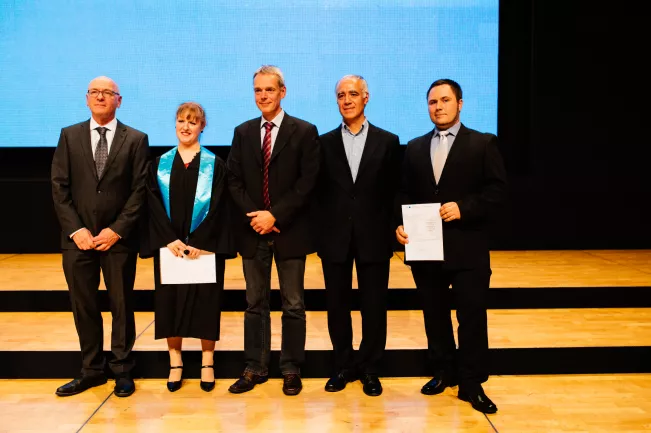Internationales Zentrum für Nachhaltige Entwicklung (IZNE)
Award: Responsibility and Sustainable Development 2016

In 2016 the prize is shared by two award winners. Julian Schulte wrote a master thesis with Prof. Dr. Stefanie Meilinger on solar energy solutions in order to save fuel of suburban buses in the sub-Saharan Africa for which he did as well experiments in Cameroon. Cornelia Wippich examined in her master thesis with Prof. Dr. Steffen Witzleben whether magnetocaloric cooling elements can also be used economically.
Julian Schulte tried to find a solution for the following problem: In many african countries and other developing countries, the transport sector is growing rapidly due to population growth and the expansion of road networks. Modern intercity buses are especially contributing to traffic growth and the air pollution in megacities increases.
It was important for him to contribute to sustainable development and aspiring engineer, he wanted to develop a solution that improves the situation in Africa - where he had lived as a child. For his master thesis, 'Vehicle based photovoltaic system for energy efficiency and cost saving', Julian has identified modeled and tested a sustainable technology for the sub-Saharan Africa.
He came up with the idea to make a simple modification of his car. He installed a photovoltaic panel on the roof of his car to produce solar energy, which can directly be used in the car. Thereby the alternator can save fuel and money also the air pollution was reduced.
In order to assess whether and under what circumstances this works, he first developed a simulation model, which he then tested with a test vehicle in Cameroon.
He stayed in Cameroon for two months to confirm under real condition his predicted savings. He carried out a study to find out if his idea is of interest to the target group.
Julians idea does not only work technically. It contributes to all dimensions of sustainability - ecologically, economically and socially. He has connected engineering with an interdisciplinary approach to the economic, ecological and social dimension in a marvelous way . Julian has demonstrated exemplary in his work, what sustainable technology development means.
Cornelia Wippich did as well an excellent work with her master's thesis 'Quality assurance and evaluation of the sources of error in the production process of a magnetocaloric material with an economic view on the analysis steps' in her studies of Analytical Chemistry and Quality Assurance. She investigated whether magnetocalorical cooling elements can be used economically.
Miss Wippich always belonged to the highly committed and interested students. She is able to acquire and apply in-depth knowledge very quickly. Miss Wippich always worked with the utmost care and accuracy. She worked on new issues easily and was able to develop her theoretical knowledge, during internships or the work on her master thesis.
Her master thesis has been carried out by Miss Wippich at the company 'Deutsche Nanoschichten GmbH' in Rheinbach, in the field of product development.
As part of the work, Miss Wippich has developed analytical methods for magnetocaloric accumulators and investigated their applicabillity and cost-effectiveness as cooling elements. A very high energy consumption is attributable to build cooling systems in the residential and commercial sectors in many regions of the world. Therefore it is of importance to develop new methods in order to increase energy efficiency in this field.
One promising approach is based, for example, on the magnetic cooling. The magnetocaloric cooling effect is used here. The functionality of this system depends mainly on the cooling and heating behavior of the material. In her work, Miss Wippich has examined possible sources for errors and quality assurance aspects during the production process of a magnetocaloric alloy, which can influence mentioned energy losses. Finally, the analytical costs involved were calculated and the cost-effectiveness of the production was assessed.
The IZNE congratulates this year's award winners and wishes them all the best on their way. In the future, the IZNE is also looking forward to exciting dissertations and research projects.